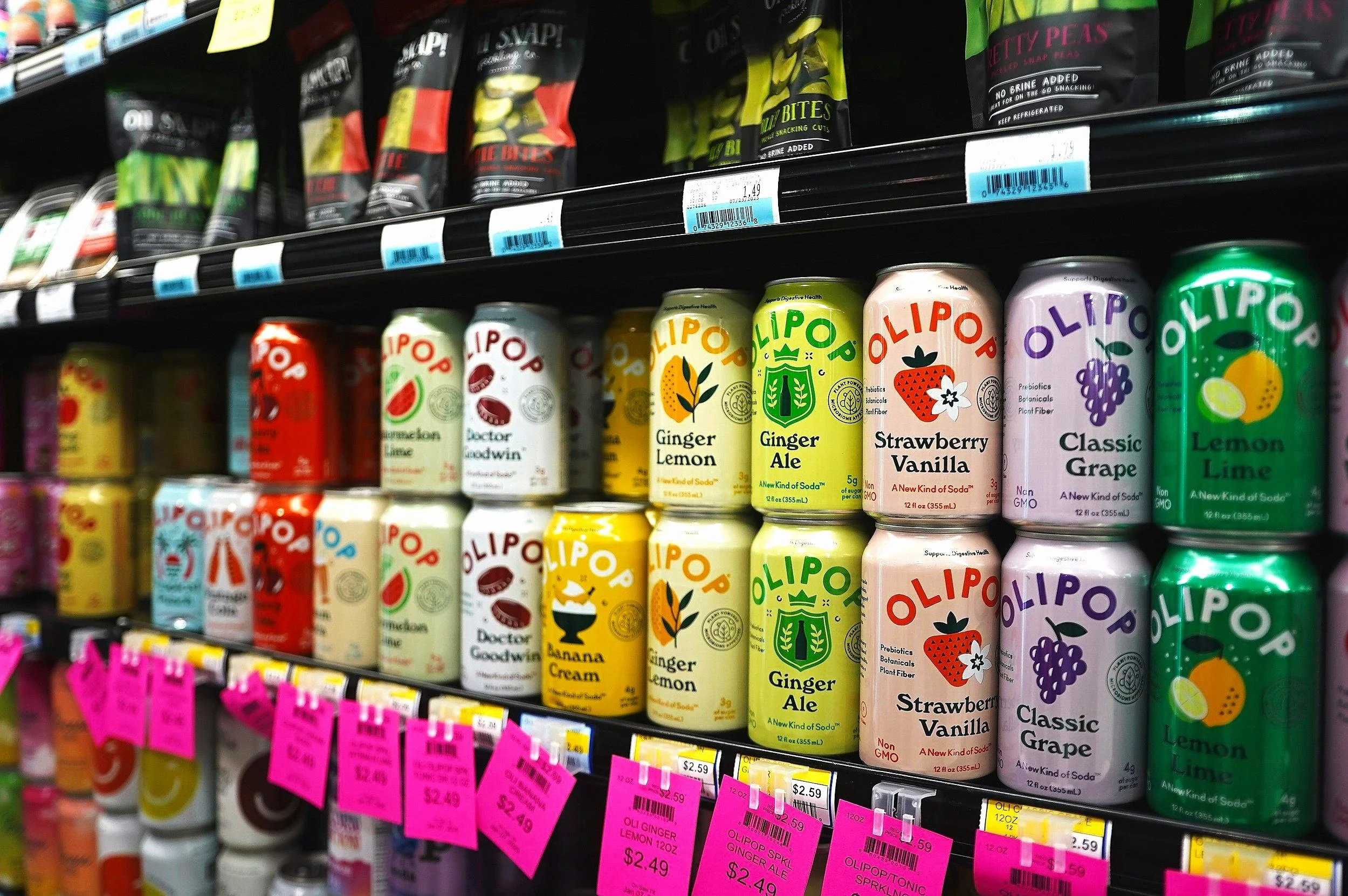Gut Soda Craze: Worth It or All Fizz?
Have you heard of gut-healthy sodas, also called functional sodas? These fizzy drinks are becoming more popular as a supposedly healthier alternative to traditional sodas like Pepsi or Coke. You’ve likely seen brands like Poppi, SunSip, Olipop, or Culture Pop in stores or online. What sets them apart from regular sodas is that they usually have less sugar and include ingredients like prebiotics or probiotics, which are often marketed as good for your gut.
Prebiotics:
Prebiotics are like food for the “good” bacteria in your gut. They help these beneficial bacteria grow, which is key for overall health. You’ll find prebiotics in certain fiber-rich foods, like veggies, fruits, and whole grains. Not all fiber sources are prebiotics, though! The cool thing about prebiotics is that they aren’t fully digested, so they make their way down to your colon. Once there, the good bacteria break them down and use them as fuel.
Probiotics:
Probiotics are live bacteria that we actually already have inside our bodies. But sometimes, things like poor diet, stress, medications, and inflammation can mess with the balance of good bacteria in our gut. That’s where probiotics come in. Eating foods or taking supplements with probiotics helps reinforce the good bacteria and keeps the harmful stuff in check. You can find probiotics in fermented foods like kimchi, sauerkraut, yogurt, miso, and tempeh, or even in supplements.
Soda Got Low Low Low Sugar … and Fiber:
There are lots of different gut sodas out there, with tons of flavors to choose from. The ingredients can vary depending on the brand, but many, like Poppi, SunSip, and Olipop, contain a prebiotic called inulin. Inulin is a type of fiber found in plants like agave, chicory root, and Jerusalem artichoke. However, most gut sodas only give you a small amount—around 2-5 grams of fiber (Olipop has the most, with 9 grams per can). One thing to keep in mind is that inulin can cause gas for some people, so if you have a sensitive stomach, you might want to take it easy on these drinks.
Inulin also adds a bit of sweetness, which is great because it helps the soda companies cut back on added sugar. Many gut sodas also use sweeteners like stevia, monk fruit, or fruit juice to keep the sweetness going without piling on the sugar. The bonus? These drinks tend to have way fewer calories and sugar than regular sodas. For comparison, a can of soda like Pepsi or Coke has about 150 calories and 40 grams of sugar. A gut soda, on the other hand, usually has only about 40 calories and 4 grams of sugar. That’s a big win if you’re trying to cut down on sugar!
But Wait! – There’s More!
You might find ingredients like apple cider vinegar, fruit juice, botanicals, and vitamins (like C, B6, and B12) in some gut sodas, along with minerals like zinc and selenium. At first glance, this might seem like a healthy bonus, but it’s mostly just clever marketing. While apple cider vinegar does have some benefits, the research is still pretty limited and based on small studies, so we need bigger studies to really know its impact. As for the botanicals in drinks like Olipop, things like calendula flower, marshmallow root, and kudzu root, there’s not a lot of science to show how much they actually help with health. Plus, many companies don’t share how much of these botanicals they’re actually putting in their drinks, so we’re left guessing how much we’re actually getting.
Let's not forget that vitamins like C, B6, and B12, along with minerals like zinc and selenium, are often added to these drinks, too. The thing is, most people aren’t deficient in these nutrients. If you’re eating a balanced diet with things like eggs, fish, lean meats, seeds, nuts, fruits, veggies, beans, and whole grains, you’re likely getting plenty of these vitamins already. And as for prebiotics, they’re found naturally in lots of whole foods like fruits and veggies, so you don’t need to rely on an expensive gut soda with a tiny bit of fiber.
The Take Away:
So, what’s the bottom line? Gut sodas aren’t a magic fix, and they shouldn’t be relied on as the answer to all your health or gut issues. That said, they’re lower in sugar and a healthier alternative to traditional sodas, so they can definitely be part of a balanced diet. But don’t get too hung up on just one or two nutrients. To stay healthy, it’s all about variety. Eating a wide range of foods is the best way to get the nutrients your body needs.
And remember, if you’re worried about your gut health, it’s always a good idea to check in with your doctor.
Remember: this post is for informational purposes only and may not be the best fit for you and your personal situation. It shall not be construed as medical advice. The information and education provided here is not intended or implied to supplement or replace professional medical treatment, advice, and/or diagnosis. Always check with your own physician or medical professional before trying or implementing any information read here.

